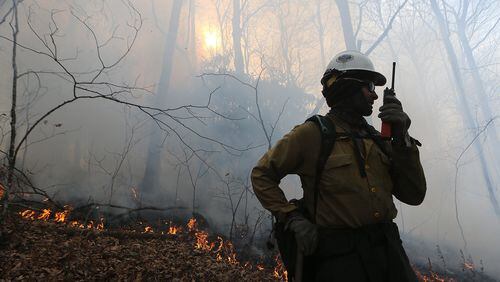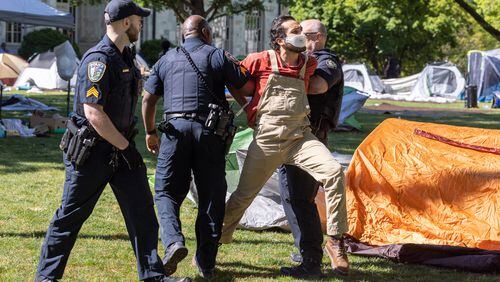For now, he’s a phantom, with fire in his footsteps.
He was near the Tallulah River Road in Rabun County Nov. 9 when some small fires sprung into life almost simultaneously. Moving fast across the dry mountain landscape, those little blazes merged to become the Rock Mountain fire. The conflagration in the Chattahoochee-Oconee National Forest has scorched more than 16,000 acres in Georgia and North Carolina.
Officials would like to talk to the nameless someone who was seen near those blazes more than two weeks ago. They’re eager to learn if he drives a blue SUV, also spotted near flames that have threatened homes and fouled the mountain air.
Only the Rough Ridge Fire, that’s burned more than 28,000 Georgia acres, is larger than the fire moving across Rabun and Towns counties.
“There were no naturally occurring fires in the area, such as lightning-caused, at the time,” Rabun County Assistant Fire Chief Justin Upchurch said in an interview last week. The blaze, he said, was deliberately set.
The Rock Mountain fire is but one blaze among many that have flared into life under suspicious circumstances. State officials say more than 350 cases have come to their attention so far this year, a marked increase over 2015.
Arson, say investigators, is always a problem — never so much as when the land is dry, the skies clear.
And Georgia’s terrain has not felt a real rain in more than a month. One clear day has followed another. The state’s timber is tinder waiting for an arsonist’s touch.
The FBI's Uniform Crime Report, an annual compilation, defines arson as "willful or malicious burning or attempting to burn, with or without intent to defraud, a dwelling house, public building, motor vehicle or aircraft, personal property of another." By that measure, setting fire to land qualifies as arson.
In Georgia, arsonists have ample opportunities to put match to wood. Nearly 26 million acres of federal, state and and privately owned wood lands comprise Georgia’s forests.
What prompts someone to set fires on purpose? Brian Clavier, chief of law enforcement for the Georgia Forestry Commission, asks that question hundreds of times each year. Some times, he directs it at a suspect tied to illegal burning. Other times, he just wonders why.
Some people start fires for insurance purposes. Other times, juveniles fooling around with matches set blazes. Revenge motivates others, Clavier said.
“You have some spiteful people out there,” he said.
And this: “Some people,” he said, “just like to start fires.”
They do it at the risk of losing their freedom. In Georgia, firebugs faced up to 20 years in prison and a $50,000 fine if convicted. Since 2008, when the forestry commission revitalized its law enforcement program, its investigators have arrested 122 people and charged them with illegal burning.
The arrests hardly stem the crimes. The forestry commission earlier this week said it had probed 353 cases to date of deliberately set fires. In 2015, the agency investigated 219.
The reason for the increase? Last year was considerably wetter than this one, Clavier noted. This year, someone with a lighter and evil intent can easily create mayhem, property destruction and fear.
“When you light that grass or woods and drive off, you have no idea of what might happen,” he said.
Firefighters do. Crews have come to the Georgia mountains from as far away as California to fight blazes that have leaped cry creek beds and crawled up hillsides like something alive.They’ve managed to contain the blazes on some slopes, but admit theirs is a fight that cannot be won without a rainfall. Until then, the forests burn.
The forestry commission has five fire investigators. Three are in the mountains, Clavier said. That leaves himself and one other official to keep watch on cases across the rest of the state.
“You could say we’re stretched pretty thin,” he said.






